Overview
The article highlights the critical role of verified hiring signals in the success of startups, particularly during the Series A funding stage. Assessing candidates across multiple dimensions—cultural fit, adaptability, technical skills, and motivation—is paramount. This multifaceted approach ensures new hires align seamlessly with the dynamic environment and growth objectives of the startup. Consequently, such alignment enhances recruitment effectiveness and fortifies organizational resilience.
By focusing on these key areas, startups can significantly improve their hiring processes. The right candidates not only contribute to immediate goals but also foster long-term success, ultimately driving the startup's vision forward. Therefore, it is essential to implement a thorough evaluation strategy that prioritizes these factors.
In conclusion, startups must recognize that effective hiring is not just about filling positions; it is about strategically selecting individuals who will thrive in a fast-paced environment. By adopting a comprehensive approach to candidate assessment, startups can build stronger teams that are well-equipped to navigate the challenges of growth and change.
Introduction
Identifying the right talent is paramount for startups, especially as they approach critical funding stages like Series A. The recruitment landscape has evolved; innovative tools and methodologies are now available to streamline the hiring process and enhance decision-making. This article delves into ten verified hiring signals that can significantly impact a startup's success, providing insights into how companies can leverage these indicators to attract top-tier candidates.
How can startups effectively harness these signals to fill positions and build a resilient, adaptable team capable of thriving in an ever-changing market?
Websets: AI-Driven Insights for Identifying Hiring Signals
Websets harnesses sophisticated to analyze vast datasets, enabling new businesses to pinpoint crucial recruitment indicators that reveal individual suitability. By meticulously examining profiles, Websets delivers valuable insights into candidates' backgrounds, skills, and cultural fit, empowering new businesses to make strategic recruitment decisions that align with their growth objectives. This AI-driven methodology accelerates the recruitment process while significantly enhancing the quality of hires—an essential factor for new companies striving to scale effectively using verified hiring signals for series A prediction. As AI continues to revolutionize hiring practices, new companies leveraging this technology can expect improved efficiency and a competitive edge in attracting top talent.
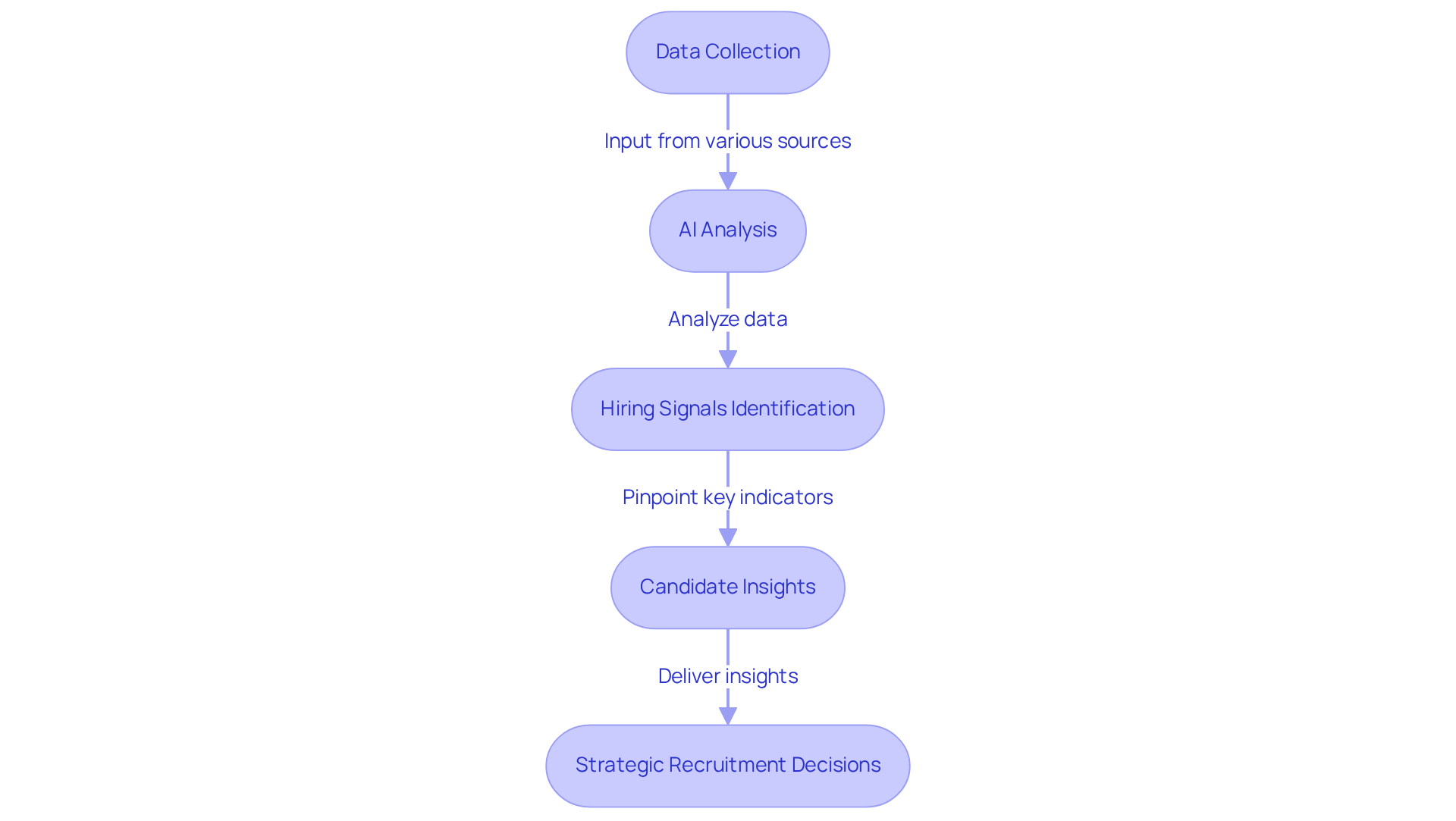
Cultural Fit: Assessing Alignment with Company Values
Evaluating cultural fit is crucial for determining whether applicants align with the core values and mission of a new venture. This process can be effectively achieved through that delve into applicants' past experiences and their compatibility with the company's culture.
For instance, asking applicants to provide examples where they demonstrated values similar to those of the new company can yield valuable insights into their potential fit. A robust cultural alignment not only enhances team cohesion but also significantly boosts employee engagement and retention—factors that are essential for new businesses striving for long-term success.
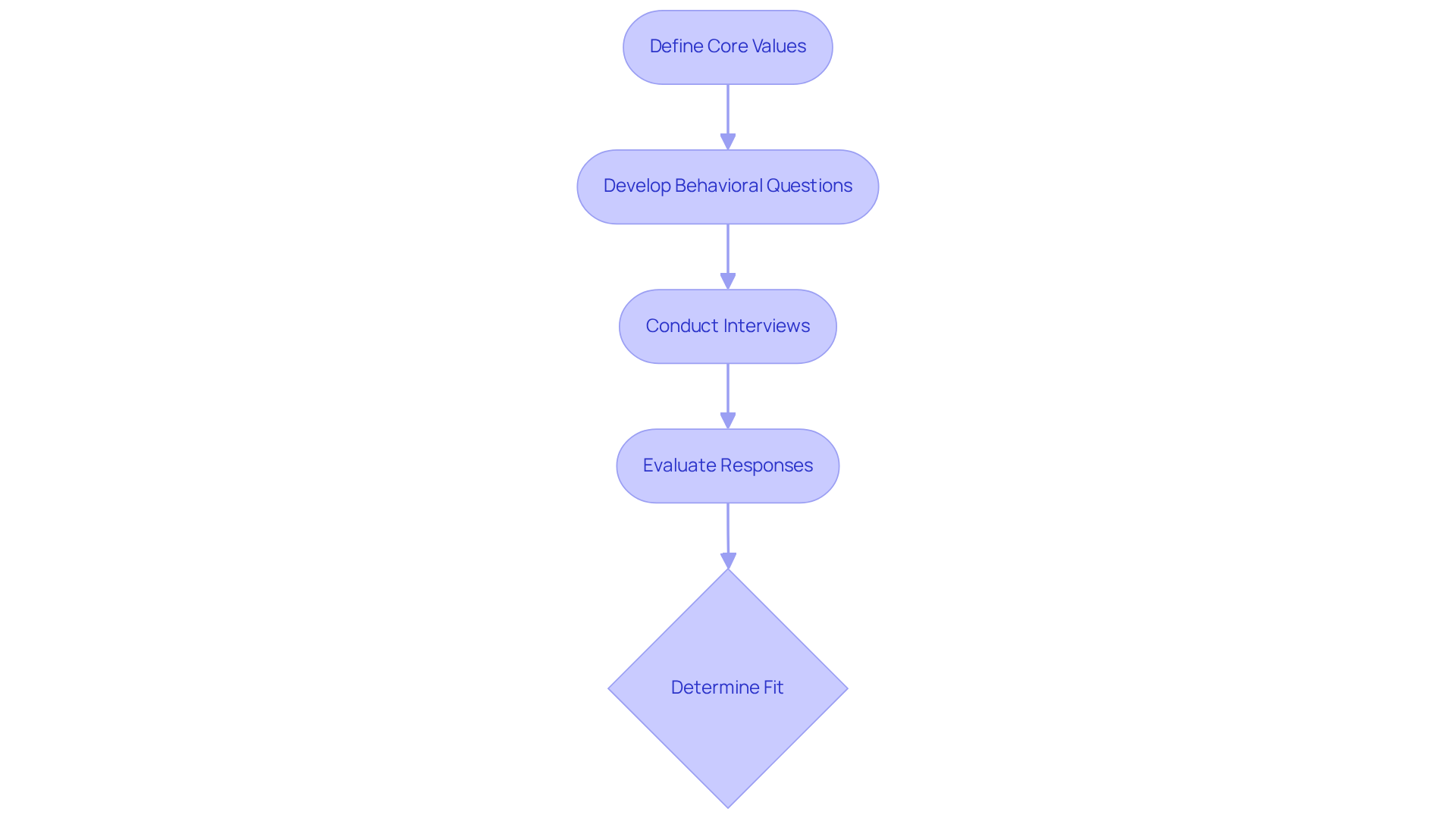
Adaptability: Evaluating Candidates' Flexibility in Dynamic Environments
Evaluating flexibility in applicants is crucial for startups navigating dynamic environments. Situational interview questions serve as an effective means to assess an applicant's adaptability and problem-solving capabilities. For instance, asking candidates to recount a time when they had to adjust their strategy in response to unforeseen challenges provides valuable insights into their change management skills. Those who proactively embrace change tend to be better equipped to thrive in startups, where roles and responsibilities frequently evolve alongside organizational growth.
To further , consider integrating questions that delve into how individuals have balanced competing priorities or adapted to new technologies. For example, asking, 'Can you describe a situation where you had to quickly acquire a new skill to meet a project deadline?' can illuminate their willingness to learn and adapt.
Data indicates that recruiting individuals with strong adaptability skills serves as verified hiring signals for series A prediction, significantly enhancing a new venture's resilience and innovation. Organizations prioritizing adaptable talent are more likely to excel in navigating economic fluctuations and market shifts, fostering a culture of continuous improvement and collaboration. As Mandy Gilbert, CEO of Creative Niche, aptly states, "Adaptability combined with a willingness to embrace challenges allows employees to thrive in innovative, fast-paced environments." By focusing on these qualities during the recruitment process, new businesses can cultivate a workforce capable of flourishing amid uncertainty and change.
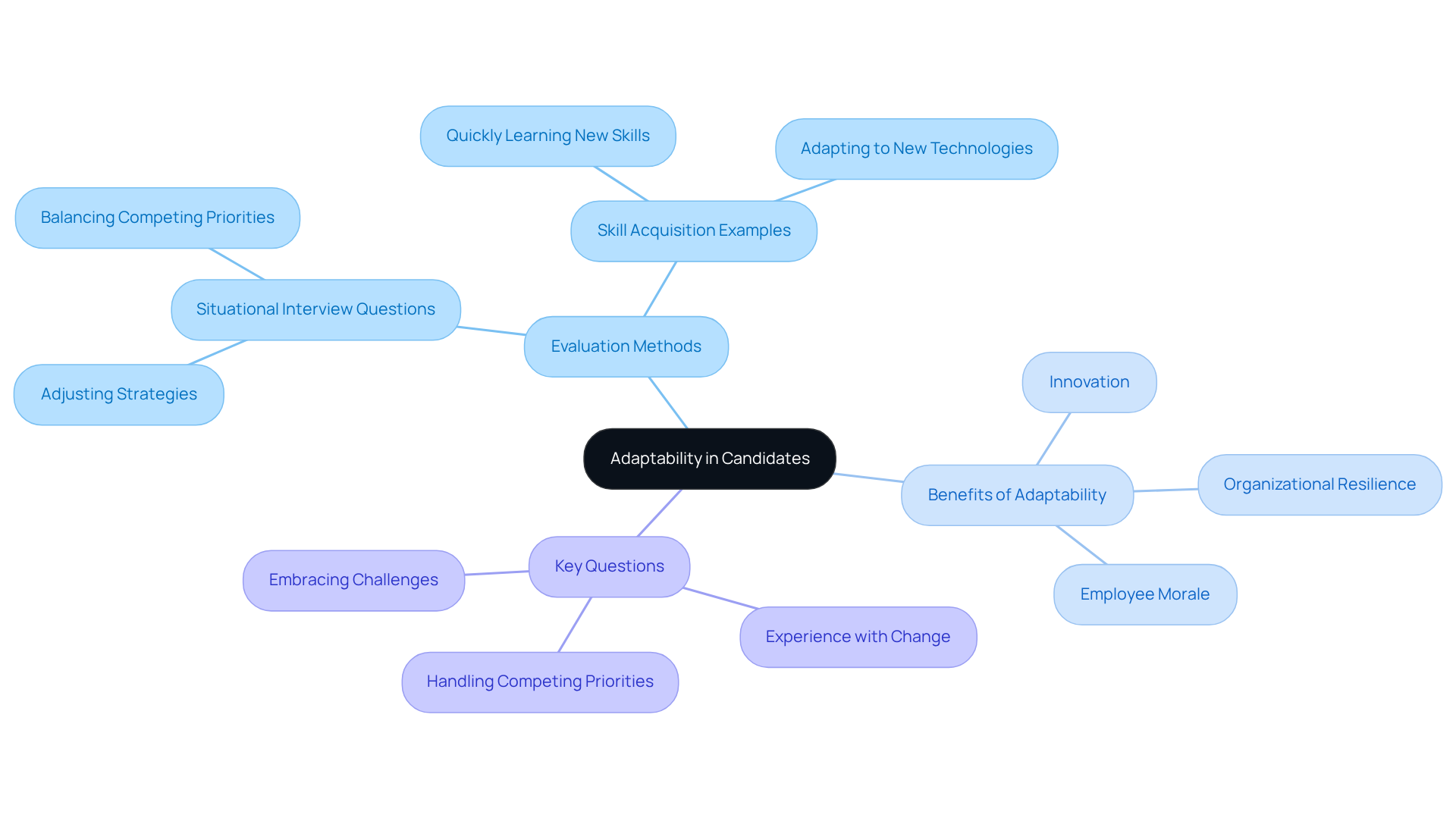
Startup Experience: Recognizing Candidates with Relevant Backgrounds
Assessing applicants with previous entrepreneurial experience is essential for identifying individuals who thrive in dynamic environments. Those who have successfully navigated the typically demonstrate heightened resilience and resourcefulness.
To uncover these attributes, interviewers should pose targeted questions about applicants' specific roles in past businesses, the obstacles they encountered, and their contributions to the company's growth trajectory. For instance, asking about a significant challenge they faced can reveal their problem-solving abilities and commitment to company culture.
Research indicates that applicants with startup experience often achieve greater success in similar roles, with studies showing that 44% of startups fail due to insufficient market demand, underscoring the importance of hiring adaptable individuals. Moreover, incorporating a quote from Corinne Sklar, who highlights the importance of self-motivated employees, can further emphasize the value of resilience in candidates.
It is also crucial to prioritize hiring individuals who align with the company's mission and values, as this alignment nurtures a robust organizational culture. By concentrating on these insights and asking specific interview questions, such as 'Can you describe a project where you had to pivot quickly?' organizations can more effectively identify passionate individuals who are well-equipped to contribute to the dynamic nature of entrepreneurial culture.
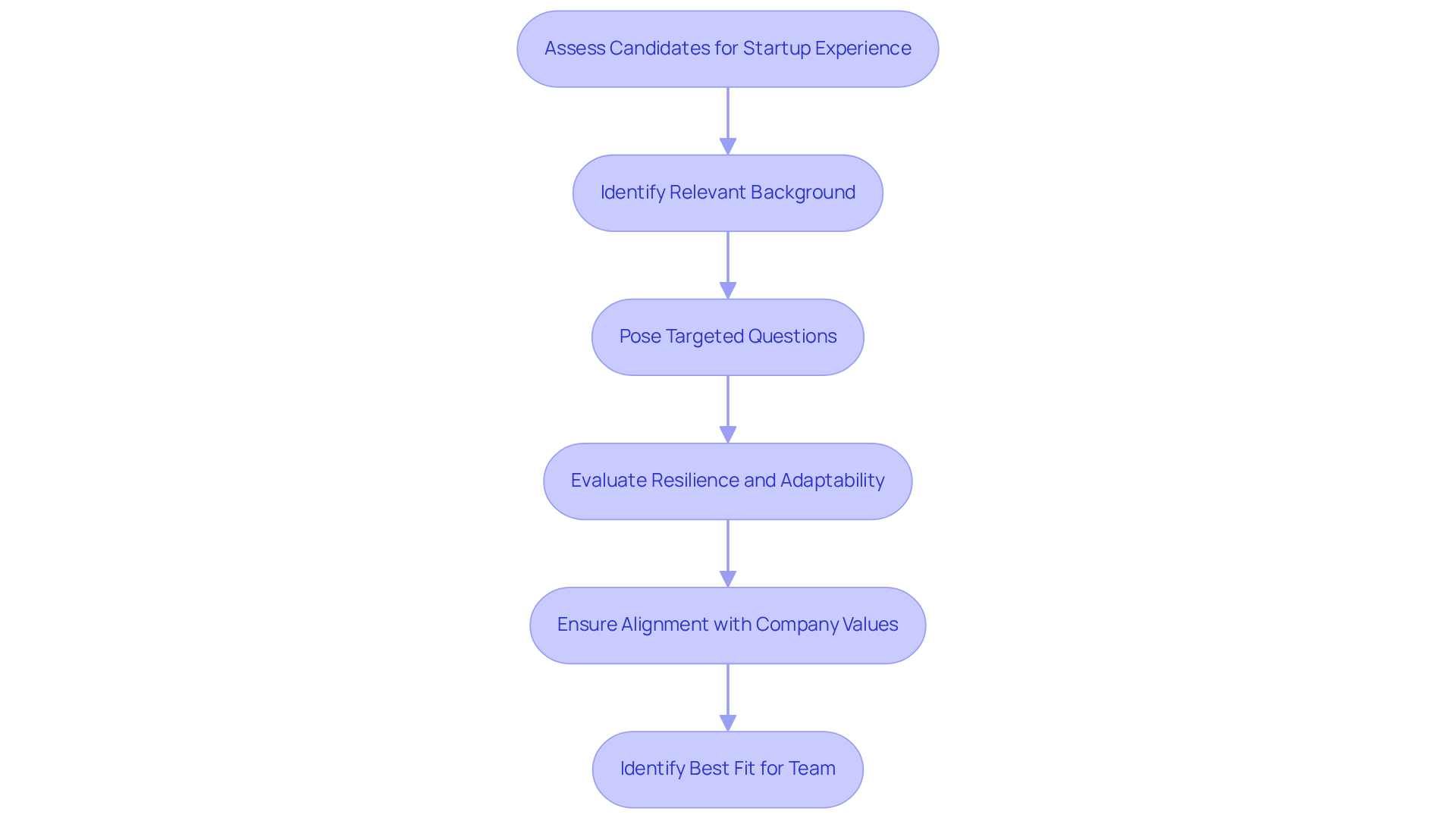
Technical Skills: Identifying Essential Competencies for Success
To effectively assess technical abilities, startups must first identify the specific competencies essential for each role, such as coding languages, software proficiency, and industry-specific knowledge. Implementing technical assessments, including coding challenges, during the interview process provides a tangible measure of an applicant's abilities. These evaluations not only offer insights into technical expertise but also reveal problem-solving abilities and adaptability in real-world situations.
For instance, real-world project evaluations enable applicants to showcase their skills through activities that closely resemble job duties, thereby enhancing the quality of recruitment choices. As Yashika Khandelwal observes, these evaluations provide a clearer and more comprehensive view of an individual's practical skills and problem-solving acumen. Furthermore, discussing previous projects and the technologies employed clarifies a candidate's practical experience, ensuring that managers make informed, data-driven decisions.
Regularly updating these assessments to reflect emerging technologies is crucial, aligning recruitment efforts with the evolving demands of the tech landscape. Additionally, with 83% of tech job seekers considering a company's commitment to diversity and inclusion significant in their job search, new businesses should focus on developing inclusive evaluations. Embracing AI tools to identify and mitigate biases in assessment tools can further enhance fairness in the recruitment process.
By integrating gamified evaluations, new businesses can engage applicants while assessing their problem-solving abilities. By embracing these trends, new companies can significantly enhance their hiring processes and secure top-tier talent.
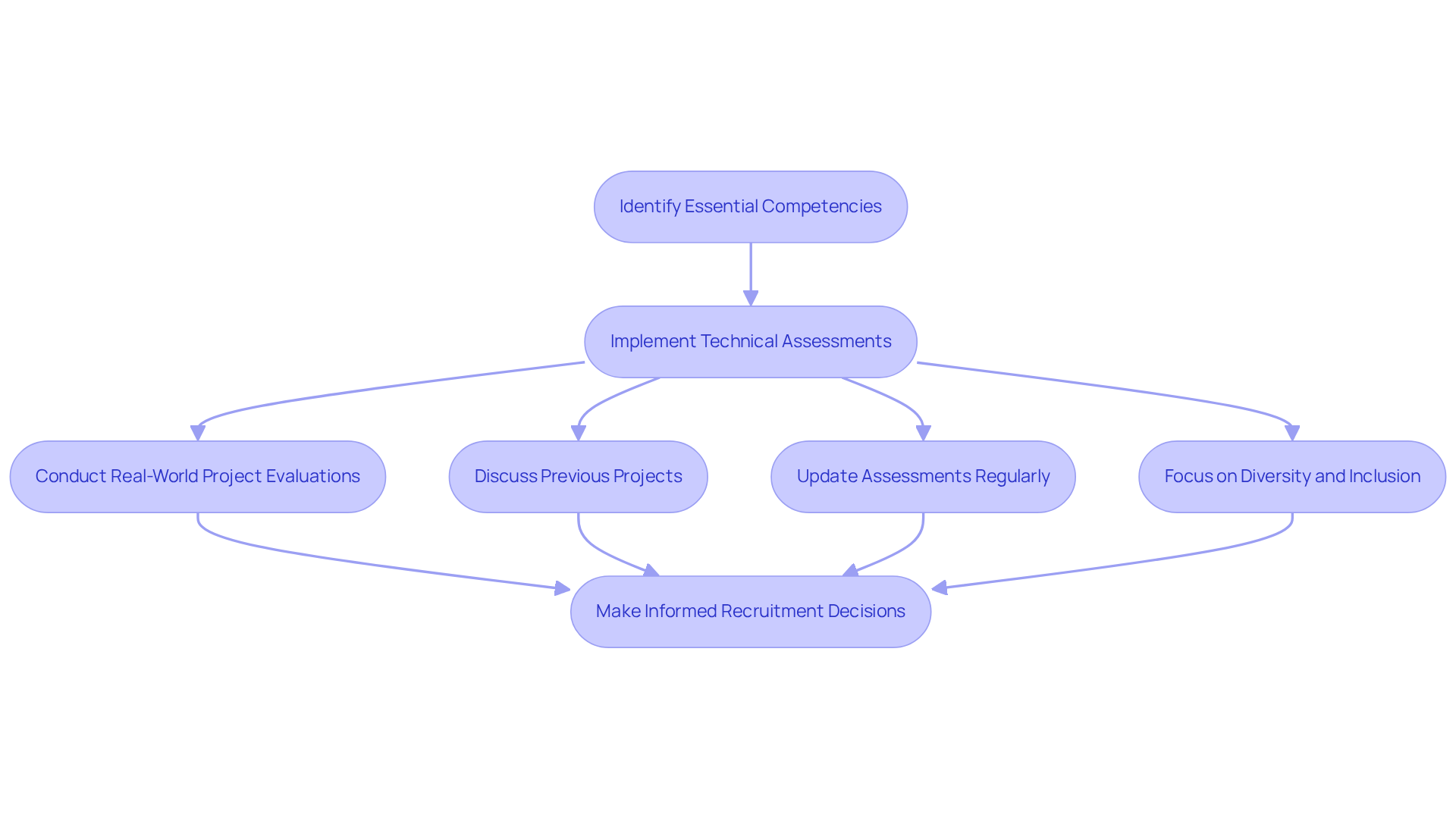
Communication Skills: Gauging Effectiveness in Team Interactions
Assessing communication abilities in applicants is essential for fostering a collaborative environment within startups. This can be accomplished through a strategic blend of targeted interview questions and practical exercises. For example, asking candidates to simplify complex concepts can effectively demonstrate their capacity to convey information clearly. Additionally, role-playing scenarios that simulate team interactions—such as employing a cooperative conflict management approach—can provide valuable insights into how individuals navigate discussions, offer feedback, and resolve conflicts.
Data reveals that effective communication can enhance team productivity by up to 25%, and organizations with strong communication practices are 50% more likely to experience reduced employee turnover. This underscores the significance of communication in the fast-paced entrepreneurial landscape. Strong communicators not only improve team dynamics but also contribute to a more cohesive work environment, which is vital for overcoming challenges.
To further evaluate communication effectiveness, consider integrating specific interview questions such as:
- "Can you describe a time when you had to explain a complex idea to someone unfamiliar with the topic?"
- "How do you approach giving constructive feedback to a colleague?"
- "What strategies do you use to ensure everyone on your team is aligned with project goals?"
These inquiries assist in assessing an individual's ability to convey ideas clearly and effectively, ensuring they are equipped to thrive in a collaborative entrepreneurial setting. Furthermore, emphasizing active listening as a critical component of communication and fostering psychological safety within teams can significantly enhance communication practices. Utilizing recommended communication tools like Slack or Microsoft Teams can also facilitate improved interactions among team members.
Problem-Solving Abilities: Assessing Critical Thinking and Innovation
To assess problem-solving skills effectively, interviewers must present applicants with hypothetical scenarios tailored to the startup's industry. This approach not only encourages individuals to articulate their thought processes while addressing challenges but also reveals their . For example, applicants may be tasked with:
- Devising a strategy to overcome a sudden market shift
- Proposing solutions for a product development bottleneck
Additionally, discussing past experiences where individuals successfully navigated complex problems can provide valuable insights into their approach and mindset.
As highlighted in NACE's 'Job Outlook 2023 Report,' more than 60 percent of employers seek evidence of problem-solving abilities when evaluating applicants, underscoring its critical importance for job success. Moreover, incorporating the Socratic method—a powerful tactic for fostering critical thinking—can significantly enhance the assessment process. Studies indicate that individuals demonstrating robust problem-solving skills are not only more likely to thrive in dynamic environments but also contribute substantially to the startup's growth and adaptability.
By integrating these evaluation methods, including assessing applicants' teamwork capabilities with AI, hiring managers can more effectively identify individuals with the essential critical thinking competencies needed to drive innovation and success within their organizations. Considering that only 12% of companies express confidence in their skill evaluations, these enhanced methods are vital for effective recruitment.
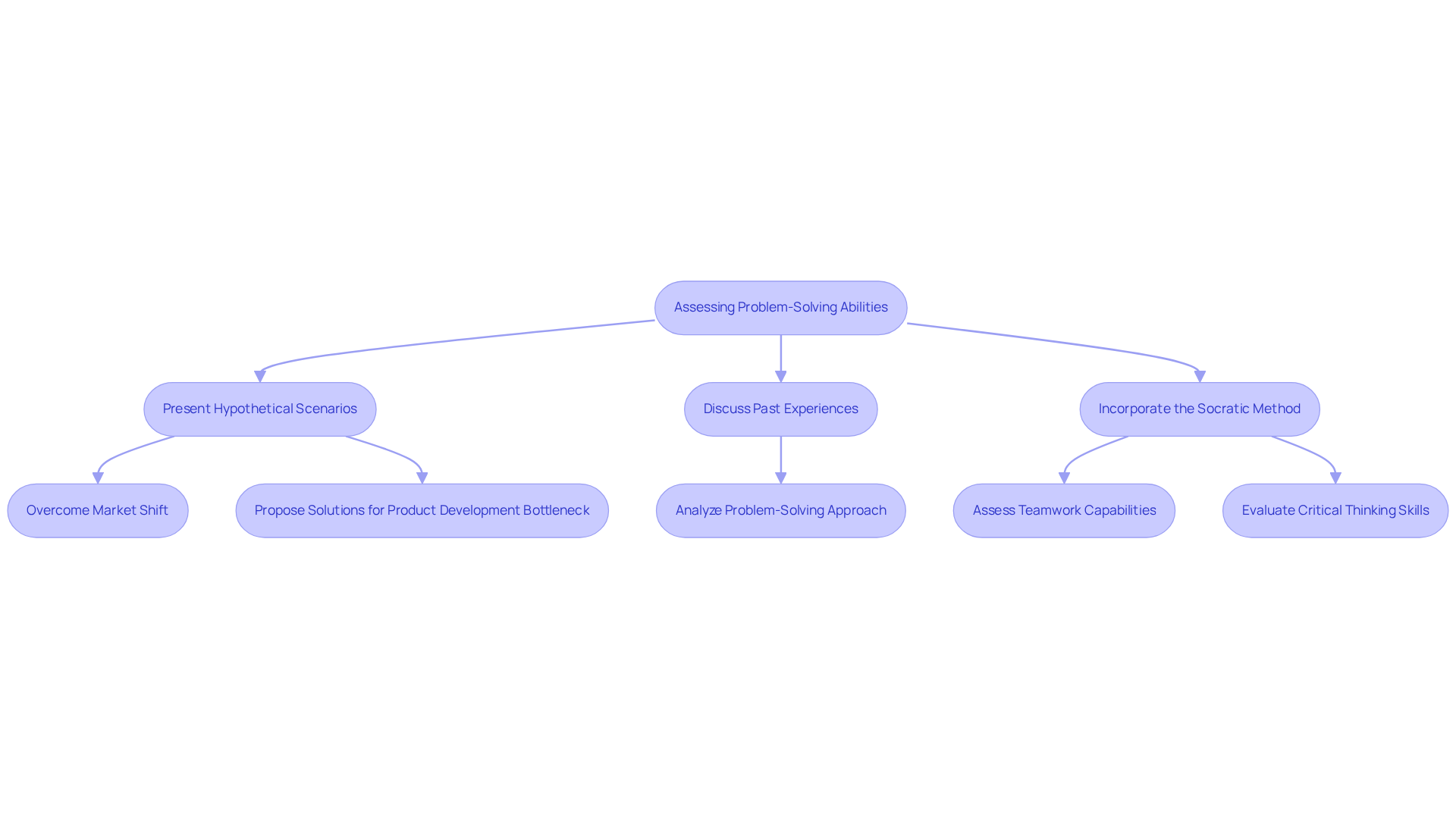
Passion and Motivation: Identifying Candidates with Drive
To effectively evaluate passion and motivation, interviewers must employ open-ended questions that compel candidates to articulate their career aspirations and the driving forces behind their achievements. Questions such as:
- What inspires you to pursue this role?
- Can you share a personal experience that shaped your career goals?
prompt applicants to reveal their intrinsic motivations. Moreover, delving into their interest in the venture's mission and asking how they envision contributing to its success can provide valuable insights into their commitment.
Research indicates that candidates who resonate with a company's mission foster a more engaged and loyal workforce. Therefore, it is crucial for interviewers to identify individuals who . Candidates exhibiting genuine enthusiasm are not only more likely to excel in a dynamic startup environment but also enhance team morale and productivity. Engaged applicants frequently demonstrate higher performance levels, underscoring the importance of prioritizing motivated individuals over those with conventional qualifications, as highlighted by business coach Shivani Gupta.
Additionally, interviewers should remain vigilant for warning signs during the recruitment process, such as candidates who mirror what they believe the interviewer wants to hear, as this may indicate a lack of authenticity.
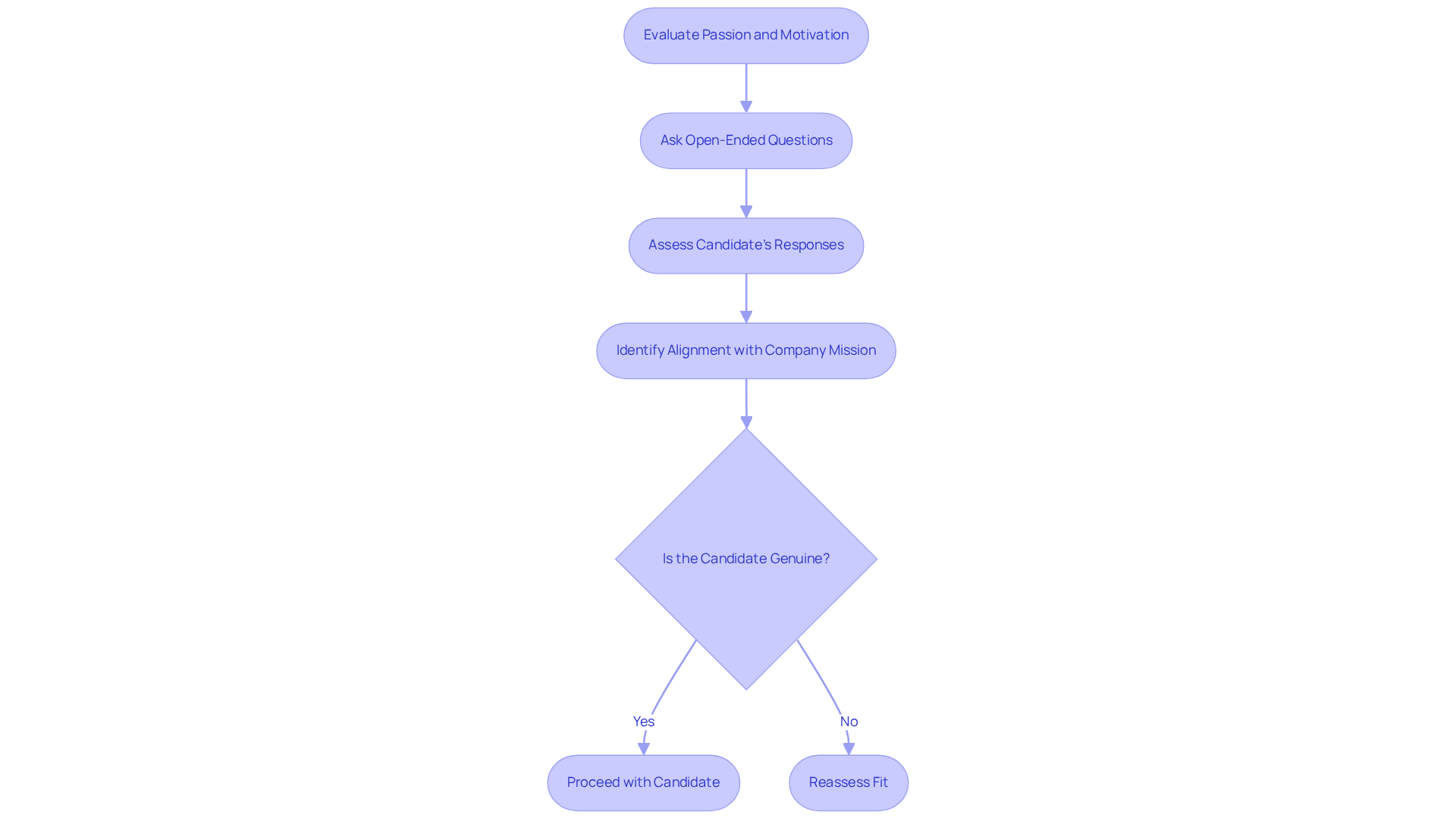
References and Recommendations: Leveraging Past Experiences for Insights
Conducting reference checks is an essential step in the hiring process, particularly for startups intent on building robust teams. By posing specific questions regarding an applicant's work ethic, strengths, and areas for improvement, employers can acquire valuable insights that affirm the individual's suitability for both the role and the company culture. For example, inquiries into how candidates have navigated challenges in previous positions can unveil their problem-solving abilities and adaptability—qualities that are vital for success in dynamic environments.
Research indicates that effective reference checks can significantly enhance hiring outcomes. Approximately 91% of US managers prioritize cultural fit over experience and competencies, highlighting the necessity of aligning new hires with organizational values. This connection accentuates the significance of reference checks in . Furthermore, with around 34% of LinkedIn users overstating their qualifications, comprehensive reference checks are crucial for validating applicants' assertions and confirming they possess the required skills for the position.
Implementing a structured reference check process can also reduce turnover rates, as individuals who resonate well with the company culture are more likely to remain long-term. The typical response rate for references is a mere 5%, and the median time taken to prepare a reference feedback report is two days. Thus, it is imperative for new businesses to optimize this process for efficiency.
To conduct effective reference checks, startups should consider asking questions such as:
- Can you describe the candidate's work ethic and reliability?
- How did the applicant handle feedback and criticism?
- Would you rehire this applicant, and why?
- Can you provide examples of the individual's teamwork and collaboration skills?
- What areas do you think the applicant could enhance?
These inquiries not only assist in verifying the candidate's claims but also offer a comprehensive view of their past performance and potential fit within the organization. As Phil Blair, an executive officer at Manpower, underscores, engaging prior supervisors in the conversation is crucial for obtaining valuable insights. By utilizing reference checks as a strategic tool, startups can make more informed recruitment decisions, ultimately fostering better team dynamics and organizational success. Additionally, neglecting to conduct reference checks can expose employers to liability for negligent hiring, making this process not merely beneficial but essential.
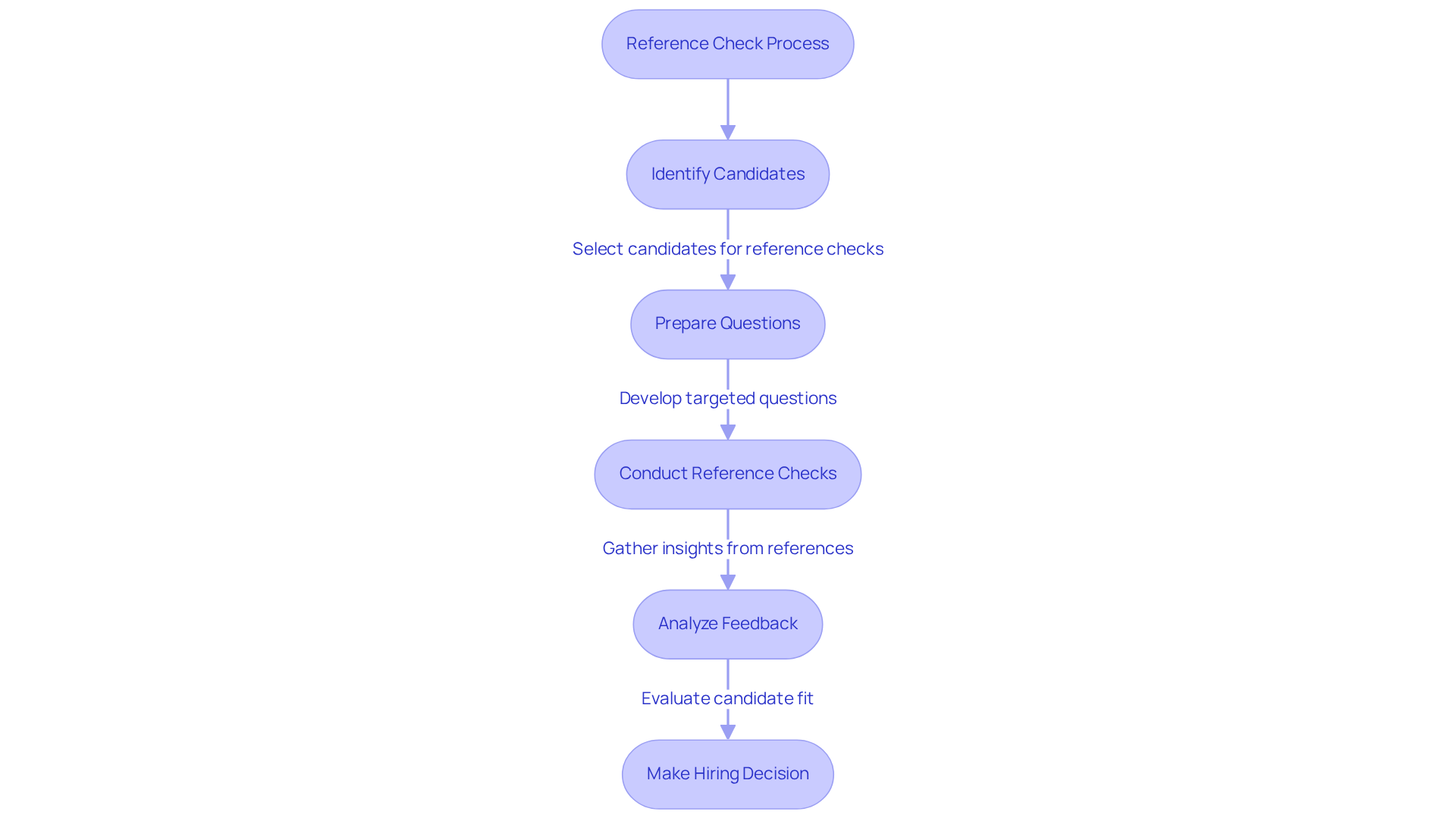
Structured Interview Process: Ensuring Consistency in Candidate Evaluation
Establishing a structured interview process is essential for effective recruitment. This begins with creating a standardized set of questions that each applicant responds to, ensuring uniform evaluation based on the same criteria. By focusing on relevant skills, interviewers can ask behavioral inquiries such as, 'Can you describe a time when you faced a significant challenge at work and how you overcame it?' or situational questions like, 'How would you handle a conflict within your team?'
To enhance objectivity in applicant comparisons, utilizing a is crucial. A common approach involves a rating scale from one to five, where each score aligns with specific performance indicators. This structured evaluation minimizes subjectivity and fosters consistency across interviews, which is vital for reducing bias. Research indicates that structured interviews significantly diminish the chances of bias impacting recruitment decisions, with studies showing they possess higher predictive validity compared to unstructured formats.
Moreover, creating a favorable applicant experience is paramount. Notably, 32% of North American individuals who withdrew from the recruiting process accepted offers from different companies. By maintaining a consistent interview process, startups can leverage verified hiring signals for series A prediction, leading to more informed recruitment decisions that ultimately enhance team dynamics and performance. This organized method not only improves the applicant experience but also adheres to best practices in recruitment, ensuring evaluations are based solely on skills and qualifications. Furthermore, AI tools can mitigate unconscious human biases in recruitment, bolstering the structured interview process. As Jen Dewar emphasizes, structured interviews foster a more equitable hiring environment, underscoring the importance of consistency and fairness in candidate evaluations.
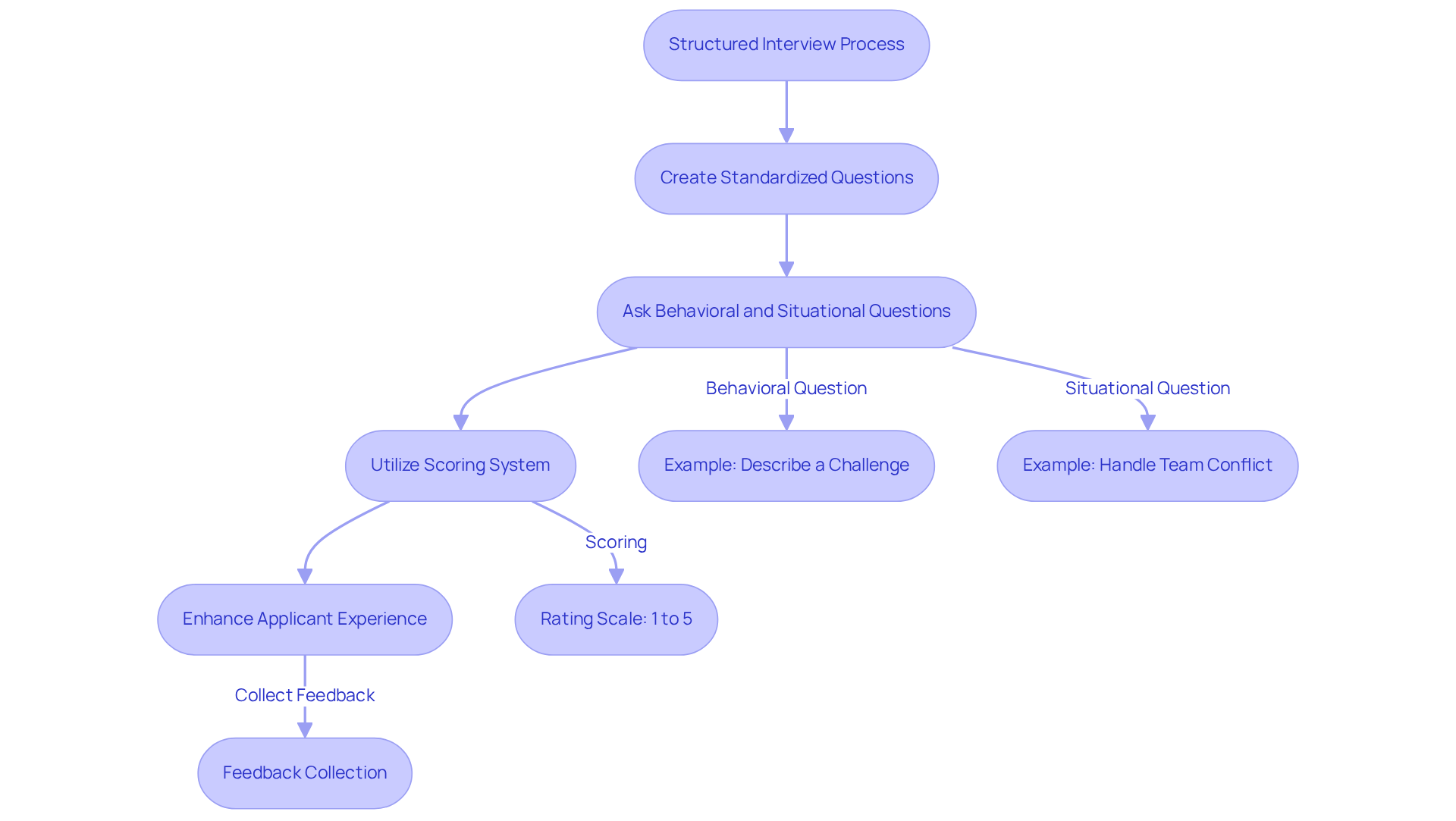
Conclusion
Identifying the right talent is a critical endeavor for startups, particularly during pivotal funding stages such as Series A. This article highlights ten verified hiring signals that can significantly influence a startup's success. By leveraging innovative tools and methodologies—especially AI-driven insights—startups can streamline their recruitment processes and enhance decision-making. This ultimately ensures that they attract the best candidates aligned with their growth objectives.
Key insights include the importance of:
- Cultural fit
- Adaptability
- Relevant startup experience
- Technical skills
Each factor plays a vital role in building a resilient and effective team. Startups must assess candidates through structured interviews, situational questions, and reference checks to thoroughly evaluate these qualities. By focusing on these verified signals, companies can cultivate a workforce that not only meets immediate needs but also thrives in dynamic environments.
In conclusion, the significance of implementing a strategic hiring approach cannot be overstated. Startups are encouraged to adopt these practices to create a robust team capable of navigating the challenges of the entrepreneurial landscape. By prioritizing the right hiring signals, organizations can foster a culture of collaboration, innovation, and resilience—ultimately setting the stage for long-term success and sustainability.
Frequently Asked Questions
What is Websets and how does it assist in recruitment?
Websets is an AI-driven tool that analyzes vast datasets to help new businesses identify crucial recruitment indicators. It provides insights into candidates' backgrounds, skills, and cultural fit, enabling strategic hiring decisions that align with growth objectives.
How does Websets enhance the recruitment process?
By using sophisticated AI algorithms, Websets accelerates the recruitment process and improves the quality of hires, which is essential for new companies aiming to scale effectively.
Why is cultural fit important in recruitment?
Evaluating cultural fit is crucial for determining if applicants align with a company's core values and mission. A strong cultural alignment enhances team cohesion and boosts employee engagement and retention.
What methods can be used to assess cultural fit?
Behavioral interview questions are effective for assessing cultural fit. Asking candidates to provide examples of past experiences that reflect the company's values can yield insights into their compatibility.
Why is adaptability important for candidates in startups?
Adaptability is vital for startups as they operate in dynamic environments. Candidates who can adjust to changes and challenges are better equipped to thrive as roles and responsibilities evolve.
What types of questions can assess a candidate's adaptability?
Situational interview questions can assess adaptability. For example, asking candidates to describe a time they had to adjust their strategy due to unforeseen challenges can reveal their change management skills.
How does recruiting adaptable individuals benefit new ventures?
Recruiting individuals with strong adaptability skills serves as verified hiring signals for series A prediction, enhancing a new venture's resilience and innovation, and helping them navigate economic fluctuations and market shifts.




